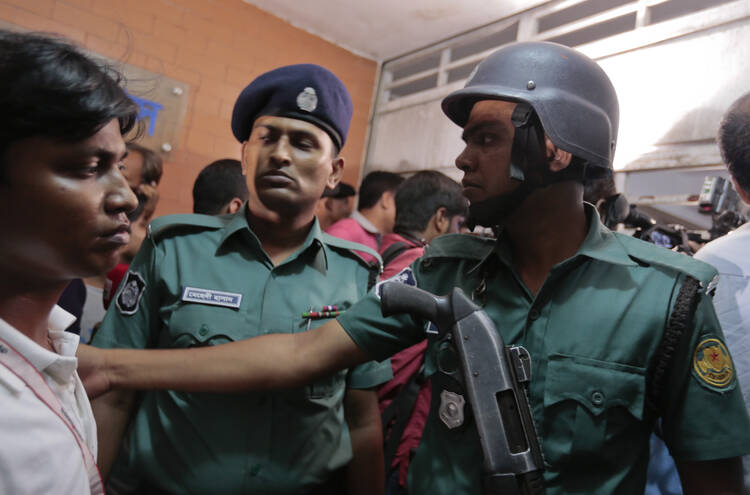Unidentified assailants fatally stabbed two men in Bangladesh's capital Monday night, including a gay rights activist who also worked for the U.S. Agency for International Development, police said, in the latest in a series of attacks targeting atheists, moderates and foreigners.
Police said they suspected radical Islamists in the attack, which occurred two days after a university professor was hacked to death. There was no immediate claim of responsibility.
The victims were identified as USAID employee Xulhaz Mannan, who previously worked as a U.S. Embassy protocol officer, and his friend, Tanay Majumder, according to Mohammed Iqbal, a police officer in Dhaka's Kalabagan area. Mannan was also an editor of Bangladesh's first gay rights magazine, Roopbaan, as well as a cousin of former Foreign Minister Dipu Moni of the governing Awami League party.
The U.S. ambassador condemned the killing, just weeks after the U.S. government and numerous rights groups urged the government of the Muslim-majority country to better protect its citizens and secure free speech.
"I am devastated by the brutal murder of Xulhaz Mannan and another young Bangladeshi this evening in Dhaka," Ambassador Marcia Bernicat said in a statement. "Xulhaz was more than a colleague to those of us fortunate to work with him at the U.S. Embassy. He was a dear friend."
"We abhor this senseless act of violence and urge the government of Bangladesh in the strongest terms to apprehend the criminals behind these murders," she said.
Security guard Mohammed Parvez told reporters that five or six young men posing as employees of a courier service entered the six-story building where Mannan lived and went upstairs to his unit. He said they hit him with knives later when they left. He was treated at Dhaka Medical College Hospital for his injuries.
A man who told local broadcaster Somoy TV that he had witnessed the attack also said at least five young men took part in the killing. He said they chanted "Allahu Akbar," or "Allah is Great" as they left the scene.
Bangladesh has been riven by a wave of deadly attacks on foreigners, religious minorities and secular bloggers, raising fears that religious extremists are gaining a foothold in the country, despite its traditions of secularism and tolerance.
Prime Minister Sheikh Hasina's government has cracked down on domestic radical Islamists. Although the Islamic State group has claimed responsibility for several attacks, including the killing Saturday of university professor Rezaul Karim Siddique in a northwestern city, Hasina's government dismisses the claims and insists the extremist group has no presence in the South Asian country.
The U.S. government earlier this month said it is considering granting refuge to a select number of secular bloggers facing imminent danger in Bangladesh.
In Washington, State Department spokesman John Kirby said Monday that remained an option, and the department was encouraging the Department of Homeland Security, which makes the determination in such cases, to keep that under consideration.
Kirby called the attack "barbaric." He described Mannan as a "beloved member of our embassy family and a courageous advocate" for LGBT rights, and pledged U.S. support to Bangladeshi authorities "to ensure that the cowards who did this are held accountable."
The rights group Amnesty International pressed the Bangladeshi government to do more to stop such killings, with its South Asia director, Champa Patel, saying that Monday's attack "underscores the appalling lack of protection being afforded to a range of peaceful activists in the country."
The group noted that homosexual relations are considered a crime under Bangladeshi law, making it harder for gay activists to report any threats against them.
"There have been four deplorable killings so far this month alone. It is shocking that no one has been held to account for these horrific attacks, and that almost no protection has been given to threatened members of civil society," Patel said.
Sen. Ben Cardin, top-ranking Democrat on the U.S. Senate Foreign Relations Committee, called the uptick in attacks "tragic" and urged Bangladesh to address the root causes of terrorism in its society.
Bangladeshi authorities, "must send a signal - loud and clear - that crimes against anyone for who they are, the work they do, who they love, or what God they worship can have no place in a modern society," Cardin said in a statement.
Copyright 2016 The Associated Press. All rights reserved. This material may not be published, broadcast, rewritten or redistributed.








